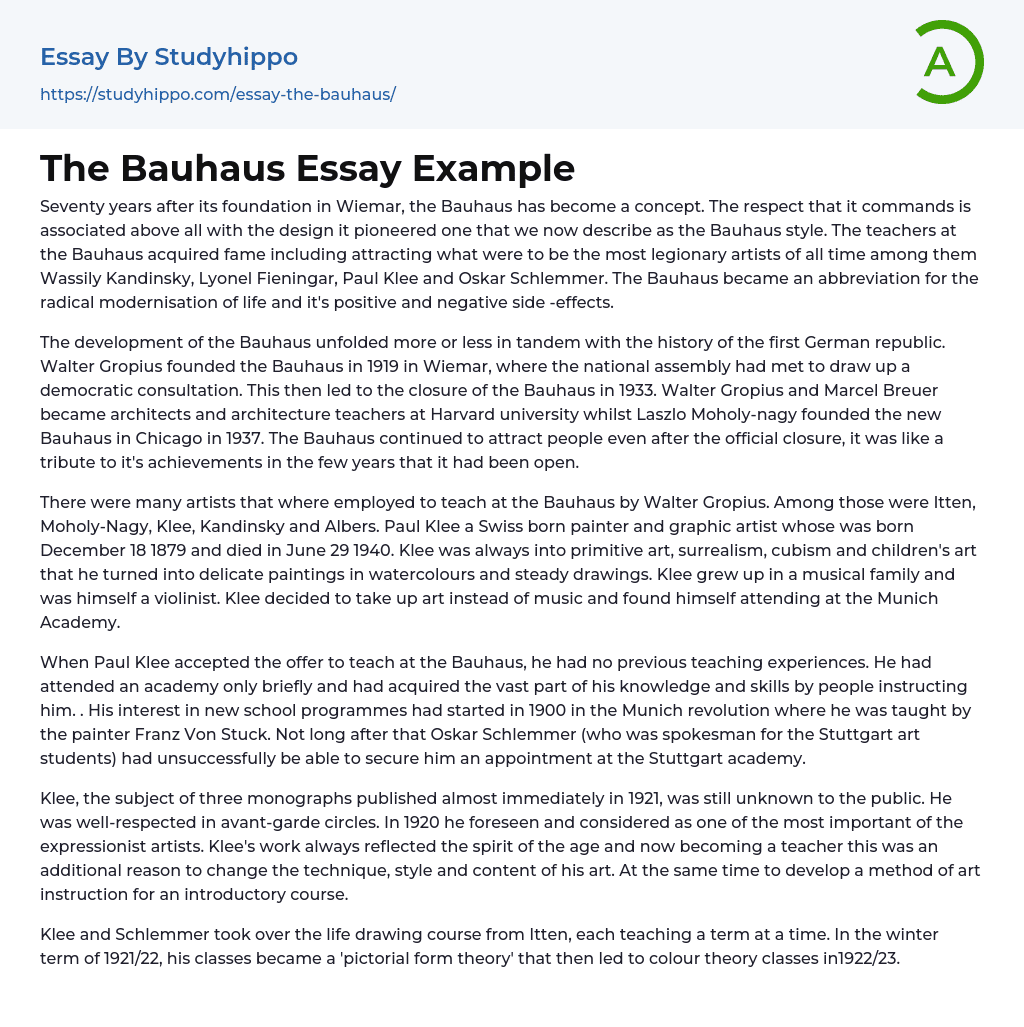The Bauhaus, founded in Wiemar seventy years ago, has evolved into a renowned concept. Its reputation primarily stems from its groundbreaking design, now known as the Bauhaus style. The Bauhaus attracted famous teachers and some of the most legendary artists of all time, including Wassily Kandinsky, Lyonel Fieningar, Paul Klee, and Oskar Schlemmer. It symbolizes the radical modernization of life, with both positive and negative consequences.
The Bauhaus, founded by Walter Gropius in 1919 in Wiemar, coincided with the early years of the German republic. This historical context also shaped its trajectory, as the closure of the Bauhaus in 1933 paralleled significant political changes in Germany. Walter Gropius and Marcel Breuer, both architects and teachers at the Bauhaus, eventually found themselves at Harvard University. Meanwhile, Laszlo Moholy-nagy established the new Bauhaus in Chicago in 1937. Despite its of
...ficial closure, the Bauhaus continued to attract individuals who admired its achievements during its brief existence.
Walter Gropius employed several artists to teach at the Bauhaus, including Itten, Moholy-Nagy, Klee, Kandinsky, and Albers. Paul Klee, a Swiss-born painter and graphic artist, was born on December 18, 1879, and passed away on June 29, 1940. Klee had a strong interest in primitive art, surrealism, cubism, and children's art, which he translated into delicate watercolor paintings and precise drawings. Growing up in a musical family, Klee was also a talented violinist. However, he chose to pursue art instead of music and attended the Munich Academy.
Although Paul Klee had no previous experience in teaching, he agreed to become a professor at the Bauhaus. His educational journey was primarily built upon learning from others and brief academic pursuits. He initially engaged with progressive educatio
curricula in 1900 under the guidance of Franz Von Stuck amidst tumultuous times in Munich. Nevertheless, efforts made by Oskar Schlemmer to get him a role at the Stuttgart academy for art students from Stuttgart were unsuccessful.
Despite being acknowledged and admired within the avant-garde circle, Klee's creations were largely overlooked by the mainstream audience even after three books about him came out in 1921. Recognized as a central personality in expressionist art during 1920, his art always mirrored the prevailing trends and impacts of that period. Transitioning into an educational role not only gave him more impetus to refine his artistic techniques, aesthetics, and subjects but also encouraged him to devise a new approach towards basic art education.
Klee and Schlemmer took turns teaching the life drawing course previously taught by Itten. Klee taught during one term, followed by Schlemmer during another term. During the winter term of 1921/22, Klee focused on teaching a 'pictorial form theory' course. This eventually evolved into colour theory classes in 1922/23.
Klee initiated his own course of study. He focused on elementary forms and eventually incorporated primary colors. The purpose of using these elements was to stimulate the limitless possibilities of design, achieved through proportion, rotation, and reflection.
At the Dessau Bauhaus, the drawing from nature that Klee had taught was abandoned completely and incorporated into Albers Vorkurs. Klee, in his course on pictorial form theory, systematically and comprehensively reflected the experiments and knowledge he had acquired through painting since 1922. Klee described his teaching as follows: "As time goes on, I see my role more clearly, which is to communicate the understanding I have obtained through creating ideas about organizing multiple
elements into a unified whole."
- Child essays
- Childcare essays
- Child labor essays
- Doll essays
- Academia essays
- Higher Education essays
- Language Learning essays
- Studying Business essays
- Education System essays
- Study essays
- First Day of School essays
- Scholarship essays
- Pedagogy essays
- Curriculum essays
- Coursework essays
- Studying Abroad essays
- Philosophy of Education essays
- Purpose of Education essays
- Brainstorming essays
- Educational Goals essays
- Importance Of College Education essays
- Brown V Board of Education essays
- The Importance Of Higher Education essays
- Online Education Vs Traditional Education essays
- Academic And Career Goals essays
- Academic Integrity essays
- Brown Vs Board Of Education essays
- Distance learning essays
- Technology in Education essays
- Vocabulary essays
- Writing Experience essays
- Importance of Education essays
- Early Childhood Education essays
- Academic Degree essays
- Academic Dishonesty essays
- School Uniform essays
- Academic writing essays
- Cheating essays
- Bachelor's Degree essays
- MBA essays
- College Life essays
- Grade essays
- Diploma essays
- Phonology essays
- Sentence essays
- Filipino Language essays
- Pragmatics essays
- Millennium Development Goals essays
- History Of Education essays
- Graduate School essays




